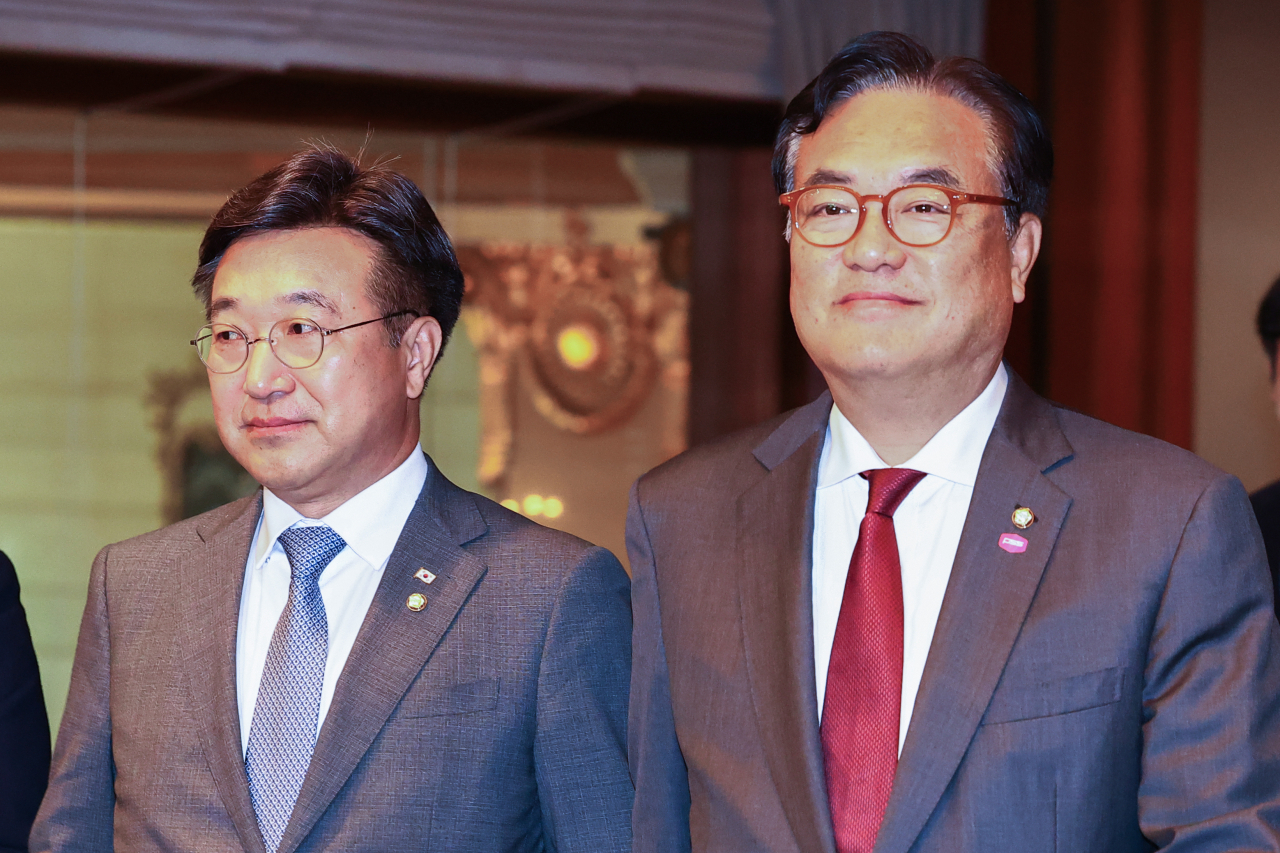Kishida, South Korean lawmakers talk history, Fukushima wastewater
Korean team to leave for nuclear wastewater inspection on May 23-24
By Kim ArinPublished : May 8, 2023 - 16:27

On the last day of his two-day Seoul trip on Monday, Japanese Prime Minister Fumio Kishida met with South Korean member-lawmakers on the South Korea-Japan Parliamentarians’ Union.
At the meeting that lasted for about 45 minutes, Kishida and the Korean lawmakers “discussed the preceding administrations’ understanding of history” and “once again reaffirmed that shared understanding,” according to Rep. Chung Jin-suk, who partook as the parliamentary union’s president.
“President Yoon still has four more years left on his term, and there is no doubt that the relations between the neighboring countries will continue to improve,” said Chung, the previous leader of the ruling People Power Party.
He said that he extended a message of welcome for “shuttle diplomacy” being run again between Korea and Japan for the first time in 12 years.
“I said that such speedy restoration of ties is chiefly owed to the courage and determination shown by the leaders of the two countries,” Chung said.
He said he also expressed his views that in order for the momentum of thawing ties to continue, exchanges on a parliamentary level -- separately from what is going on with the governments -- were “highly significant.”
“I said that the parliamentary union will do what it can do support the improvement of Korea-Japan relations.”
In a statement issued following the meeting, Japan’s Ministry of Foreign Affairs said Kishida told Korean lawmakers that he hoped for active parliamentary exchanges to serve as a bridge between the two countries.
Korea’s liberal opposition, the Democratic Party of Korea, repeated calls for an apology from the prime minister over wartime atrocities during Japan’s colonial rule of the peninsula. The party also mounted criticism against the Japanese plan to dump wastewater from an earthquake-wrecked nuclear power plant in Fukushima.
Main opposition Democratic Party of Korea Rep. Yun Ho-jung, another Korean lawmaker who was at the meeting, said while thanking Kishida for his visit that he sought an apology from for historical disputes “on behalf of the opposition party.”
“I told (Kishida) that to live up to the spirit of the Kim Dae-jung-Keizo Obuchi Declaration, two heads of states should not look away from history,” Yun said. The Kim-Obuchi Declaration of 1998 outlined building a “future-oriented relationship based on reconciliation.”
Yun added that he also conveyed concerns over the release of treated wastewater stored at the Fukushima nuclear power plant.
Also on Monday, the Democratic Party’s head Rep. Lee Jae-myung held a press conference condemning Japan’s decision to discharge the wastewater, which will have “an impact globally.”
“It is regrettable that our administration is failing to represent the interests of the Korean people on this issue of safety, while indiscriminately accepting Japan's demands,” he said.
He added that as Japan was set to release the water from the plant as planned, the proposed on-site inspection “would not mean much.”
At the summit held Sunday, Yoon and Kishida agreed to a panel of Korean experts conducting a safety inspection on the nuclear power plant’s water release into the ocean. The panel will set out on a two-day visit on May 23-24, according to a senior official at the Foreign Ministry in Seoul.
The Democratic Party earlier sent its own delegation of lawmakers to Tokyo and Fukushima last month to look into the potential safety problems, but the trip was largely unfruitful.



















![[Today’s K-pop] Treasure to publish magazine for debut anniversary](http://res.heraldm.com/phpwas/restmb_idxmake.php?idx=642&simg=/content/image/2024/07/26/20240726050551_0.jpg&u=)